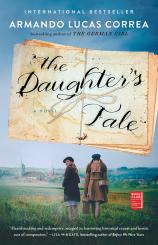Excerpt
Excerpt
The Daughter's Tale

“Is this Ms. Duval? Elise Duval?” The voice on the phone repeated her name while she remained silent. “We were in Cuba recently. My daughter and I have some letters in German that belong to you.”
Elise had always been able to foresee the future. But not today. Today, she could never have predicted.
For an instant, she thought the call must be a mistake. After all, she was French, and had been living in New York for the last seventy years, ever since an uncle on her mother’s side had adopted her at the end of the war. Now, her only living relatives were her daughter, Adele, and her grandson, Etienne. They were her entire world, and everything that came before was shrouded in darkness.
“Ms. Duval?” the woman’s voice said again, gentle but insistent. Fraught with terror, Elise groped for some support, afraid she might faint.
“You can come see me this afternoon,” was all she managed to say before hanging up, neglecting to check first whether she had any appointments, or if she should consult her daughter. She heard the woman’s name, Ida Rosen, and her daughter’s, Anna, but her memory was a blank, closed to the past. She was certain only that she had no wish to verify the credentials of the stranger and her daughter. There was no need to give them her address, because they already had it. The call had not been a mistake. That much she knew.
Elise spent the next few hours trying to imagine what might lie behind their brief conversation. Rosen, she repeated to herself as she searched among the dim shadows of those who had crossed the Atlantic with her after the war.
Only a few hours had passed, and already the call was beginning to fade in her limited, selective memory. “There’s no time to remember,” she used to tell her husband, then her daughter, and now her grandson.
She felt vaguely guilty at having agreed so readily to receive this stranger. She should have asked who had written the letters, why they had ended up in Cuba, what Mrs. Rosen and her daughter were doing there. Instead, she had said nothing.
When the doorbell finally rang, her heart leapt out of her chest. She tried to shut her eyes and prepare herself, taking a deep breath and counting the heartbeats: one, two, three, four, five, six—a trick learned from childhood, one of her only clear memories. She had no idea how long she had spent in her bedroom, dressed in her navy-blue suit, waiting.
It was as if her senses had suddenly been heightened at the sound of the bell. Her hearing became sharper. Now, she could just make out the breathing of the two strangers outside the door waiting to see a weary old widow. But why? She paused with her hand on the lock, hoping against hope this visit was no more than an illusion, something she had dreamed, one of the many crazy notions brought on by the years. She closed her eyes and tried to visualize what would happen, but nothing came.
It was becoming clear to Elise that this meeting wasn’t about the future. Instead, it signified the return of a past she could no longer keep out, a constant shadow ever since the day she had disembarked in the port of New York, when the hand of an uncle who was to become a father rescued her from her oblivion. But he could never bring back her memories, removed by necessity, for the sake of her survival.
She opened the door resolutely. A shaft of light blinded her. The noise of the elevator, a neighbor going downstairs, a dog barking, and the wail of an ambulance siren distracted her for a second. The woman’s smile brought her back to reality.
Elise motioned for them to come in. Without yet saying a word, she avoided making the slightest gesture that might betray her terror. The girl, Anna, who looked to be twelve years old, came over and hugged her round the waist. She had no idea how to respond. Maybe she should have let her hands drop onto the little girl’s shoulders, or stroked her hair the way she used to do when her own daughter was the same age.
“You’ve got blue eyes,” she said timidly.
What a ridiculous thing to say! I should have said she had beautiful eyes, thought Elise, trying not to notice that they were the same blue, almond-shaped, and hooded eyes as hers, that her profile . . . No, she told herself fearfully, because it was her own reflection she saw in the face of this strange little girl.
Making an effort, Elise led the pair of them into the living room. Just as she was asking them to sit down, Anna handed her a small, lusterless, ebony box.
Elise carefully opened the box. By the time she finished unfolding the first letter, written in faded ink on a page from a botanical album, her eyes were brimming with tears.
“Does this belong to me?” she whispered, clasping the crucifix around her neck, a charm that had accompanied her ever since she could remember.
“Your eyes,” she repeated, staring at Anna with anguish.
Elise tried to stand up, but could feel her heart failing her. She was losing control over herself, over the life she had so carefully constructed. She could see her own face at a distance, staring at the scene from afar like another witness in the room.
Her palms grew sweaty, the box fell from her grasp, the letters spilling out onto the carpet. A photograph of a family with two little girls with a frightened gaze lay buried among yellowing sheets of paper. Elise saw herself closing her eyes and a stabbing pain in her chest took away her balance. Collapsing onto the faded carpet, she knew it was happening, at last: the final act of forgetting.
Silence, walls of silence all around her. She tried to recall how many times a heart could stop and then start beating again. One . . . silence. Two . . . another, even longer pause. Three . . . the void. The silence between one heartbeat and the next cut her off from the world. She wanted to hear one more. Four. And another. She breathed in as deeply as she could. Five . . . just one more and she would be safe. Silence. Six!
“Elise!” The shout made her stir. “Elise!”
That name, that name. Elise. It wasn’t her, for she was no one. She did not exist, she had never existed. She had lived a life that didn’t belong to her, had created a family she had deceived, spoke a language that wasn’t hers. All these years spent fleeing from who she truly was. To what end? She was a survivor, and that was not a mistake, nor a misunderstanding.
By the time the paramedics lifted her onto the gurney, she had already forgotten the other woman and her blue-eyed daughter, forgotten the letters written in a strange language, the photograph.
But in the space of forgetting, a memory emerged. Herself, as a little girl, trying to find her way through a thick forest, surrounded by enormous trees that prevented her from seeing the sky. How could she know where she was going, if she couldn’t see the stars? Blood on her cheek, hands, her dress, but not hers. A body lying lifeless on the ground in a gory mess. No helping hand to support her. She could feel the thick, damp air, hear her childish voice stammer: “Mama! Mama!” She was lost, abandoned in the darkness.
In the fog of jumbled memories, she saw it all: the letters, the ebony box, the purple jewel case, a threadbare soccer ball, a wounded soldier. Withered flowers and blurred lines.
It had taken this little girl, Anna, for Elise to discover who she really was, stripping off the mask she had been wearing for seven decades. The past was now rewarding her with this final, unexpected visit, with the image of handwriting on the pages of a familiar book, a book not important because of what it said, but for the hours she had spent tracing the letters and flowers that had been with her every day of her childhood.
“Hydrocharis morsus-ranae,” she whispered.
She felt herself floating freely like one of those aquatic plants, its flowers tinged with yellow. She was delirious, but if she could remember, that meant she was still alive. It was time to allow herself to die, but first she had to do something with the pages torn from the mutilated book.
Yet the damage was done; she had no right to ask for forgiveness. She shut her eyes and counted her heartbeats. The silences between them helped drive away the fear. Who had taught her to do that?
“Ready!” she heard.
She felt a weight on her crushed chest. The first electric shock produced palpitations of a kind she had never experienced. She told herself she wasn’t going to let them revive her. She didn’t want to live. As a child, she had been put on an enormous ocean liner, and had never dared to look back. She wasn’t going to look back now.
The second shock brought new warmth, forced her to open her eyes. Tears began to flow, beyond her control. She couldn’t tell if she was alive or not, and that made her weep. Someone took her by the hand and gently stroked her brow.
“Mama!” She heard her daughter’s tearful voice. She was so close that Elise could not distinguish her features.
Would she be able to find the words to explain to Adele, her only daughter, that she had brought her up with a lie?
“Elise, how do you feel? I’m so sorry . . .” Ida was there as well, clearly distressed by the effect of her visit.
Adele stood silent. She couldn’t understand what this stranger and her daughter were doing here in the hospital with her mother, a dying old woman.
In a language she no longer recognized, Elise heard herself muttering a phrase that came from somewhere beyond: “Mama, verlass mich nicht.” Don’t leave me.
One . . . silence, two . . . silence, three . . . silence, four, five . . . She took a deep breath, waiting for the next heartbeat.
The Daughter's Tale
- Genres: Fiction, Historical Fiction
- paperback: 336 pages
- Publisher: Washington Square Press
- ISBN-10: 1501187945
- ISBN-13: 9781501187940



